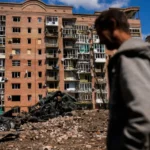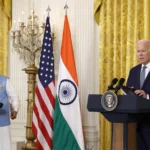Winter has arrived and health experts are warning that a new surge of COVID-19 infection is looming, particularly in the United States and Europe, where COVID-19 cases are already high enough.
Daily global COVID-19 infections are projected to rise slowly to about 18.7 million by February from the current 16.7 million average daily cases, driven by the northern hemisphere’s winter months, Reuters reported on November 12 citing an analysis of the University of Washington’s Health Metrics and Evaluation (IHME).
Far fewer infections are expected than last winter’s estimated peak daily average of about 80 million cases in January of 2022 which was driven by the rapid spread of the Omicron variant, the analysis said.
Some Western countries are mulling to set strengthened rules to fight the virus again, as another step of adjusting back and forth their relevant policies.
COVID-19 and United States
To date, more than 1.09 million people have died from COVID-19 in the United States since the start of the pandemic in March 2020. Biden administration officials said that the US COVID public health emergency will remain until at least April of next year.
A surge in Germany has peaked already and will likely spread to other parts of Europe in the coming weeks, the IHME report said. Germany’s federal health minister urged states to reintroduce masks mandatory for indoor areas.
It is also confusing because it has been September 20 when US President Joe Biden has declared the pandemic over in the US, even as the number of Americans who have died from COVID continues to rise. Also, Europe has long been the pioneer of living with COVID-19 in the pursuit of building up resilience.
During the pandemic’s crucial early days and weeks, then president Donald Trump and other authority figures actively minimized the virus’s threat. Trump dismissed it as no worse than the flu and said the pandemic would be over by Easter.
Because the virus first emerged in Wuhan, China, Trump, and others have claimed, without evidence, that it started in a lab there, and some conspiracy theorists believe it was engineered as a bioweapon.
However, the US intelligence agencies have categorically denied the possibility that the virus has been engineered in a lab, stating that “the Intelligence Community … concurs with the wide scientific consensus that the COVID-19 virus was not man-made or genetically modified.”
Slow and flawed testing was another key factor that caused the virus spread undetected for weeks because the earliest criteria for getting a test were too stringent—one often had to have been hospitalized with severe symptoms and have recently traveled to a “high-risk” area. By the time testing became somewhat more available, community spread was already rampant in many places, making it difficult or impossible to do contact tracing and isolate people before they infected others.
Also, the US efforts to implement timeworn methods of combatting an infectious disease—testing people who may be sick, tracing their contacts, and isolating or quarantining those who are positive or exposed—were hindered by insufficient resources. Several countries required those who may have been exposed to stay at a government-approved hotel or other facilities for a quarantine ranging from a few days to a couple of weeks. Such policies were harder to implement in the US, a nation that prides itself on personal freedoms.
Although face masks are now widely considered a crucial part of stopping transmission, US and global health authorities were slow to recommend them for public use. Trump spent months playing down the effectiveness of masks, initially refused to be photographed with one on, and mocked former Vice President Joseph R. Biden Jr. for wearing one.
Now when experts predict a new surge in Winter, Western countries seem again at loss in their COVID-19 policies.
An increase in COVID-19 cases could overwhelm hospitals already dealing with crowded emergency rooms and bed shortages from a wave of Respiratory Syncytial Virus (RSV) and influenza cases. Failure to plan and invest in countermeasures, monitoring, and research and development threatens the ability of the United States to respond quickly,
The US Congress’ shortsighted failure to invest in existing and improved COVID-19 counter-measures, disease tracking, and monitoring has left the country unprepared for future stages of the pandemic, leaving the nation vulnerable to increased illness, disability, and death, as well as economic disruption.
Shafiq Mansoor is an independent research scholar specializing in societal perceptions and international relations.





Add a Comment